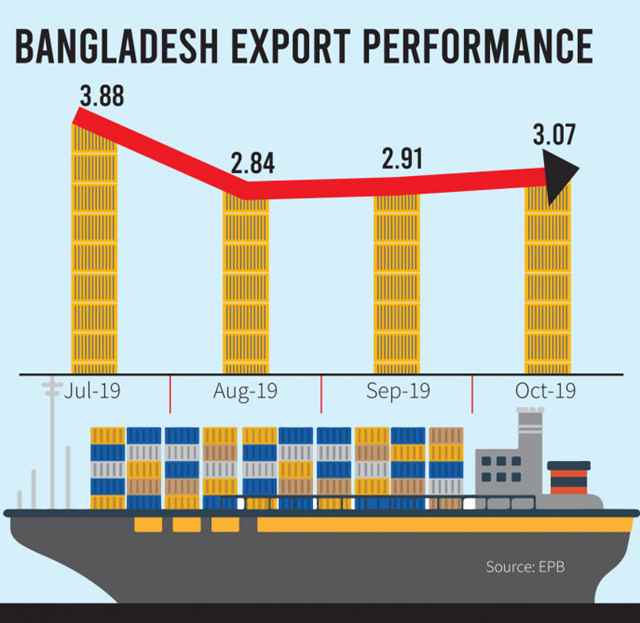SAM
Published:2019-11-08 01:52:12 BdST
Businesses blame stronger taka for negative export growth
FT ONLINE
Business leaders have blamed the artificial appreciation of taka against US dollar for the negative export growth.
They also blamed consistent delays in unloading shipments at ports for the export slump.
The businessmen made the observations at a meeting with Commerce Minister Tipu Munshi at the Secretariat on Wednesday.
However, the minister linked the negative export growth to businessmen undercutting prices of readymade garment products.
The chairman of the National Board of Revenue, the finance secretary, the commerce secretary, and representatives from different government and private organisations such as the Export Promotion Bureau, Federation of Bangladesh Chambers of Commerce and Industries and Bangladesh Garment Manufacturers and Exporters Association also attended the meeting.
US dollar is selling at Tk84.74. But the Real Effective Exchange Rate (REER, a measure of taka's value in comparison to the currencies of Bangladesh's major trading partners) shows the price of dollar at around Tk140.
Addressing the issue, Bangladesh Garment Manufacturers and Exporters Association President Rubana Huq said, "The competitive edge is an important factor in the readymade garment export. Buyers will buy products from a place that offers the most benefits.
"Bangladesh is losing its competitive edge in this market due to the higher real exchange rate of taka against US dollar and complications related to the unloading of shipments at various ports."
Adding that a total of 59 factories have shut down over the course of the past six months, she further said, "More than 25,000 workers have lost their jobs. Remaining factories are receiving comparatively less orders.
"Under the circumstances, we (the business community) have asked the government for more incentives."
Discussing the currency exchange rate, Rubana Huq said Tk80.51 was the exchange rate against $1 in September 2012. Meanwhile, in September this year, the exchange rate stood at Tk82.87 per US dollar, showing a currency exchange rate change of 2.92 percent.
At the same period, the currency exchange rate of Pakistan, India, Turkey, Vietnam, China and Sri Lanka against the US dollar changed by 66.40, 35.03, 218.7, 10.99, 12.62 and 37.69 percent respectively.
The Bangladesh Garment Manufacturers and Exporters Association president proposed an additional incentive on the export price to be introduced under the Foreign Currency Realisation Programme.
The organisation also demanded a number of other incentives such as loan rescheduling, packing credit, increasing the deadline for advance payment, dropping interest rate in the Export Development Fund, withdrawal of source tax on cash incentives and speeding up the shipment unloading process in ports.
Meanwhile, Federation of Bangladesh Chambers of Commerce and Industries President Sheikh Fazle Fahim said, "Despite resolving all necessary formalities, processing a shipment still takes 7-10 days to complete. These delays are preventing us from delivering shipments to buyers on time.
"Sometimes, we are forced to deliver goods using planes. Which in turn increases the cost and decreases the competitive edge of Bangladesh."
Commenting on the matter, National Board of Revenue Chairman Md Mosharraf Hossain Bhuiyan said, "Every customs house has been modernised and scanners are being installed at ports. Initiatives are being taken to speed up the processing time of shipments.
"The business community will soon notice the positive impact of these initiatives."
Speaking about taxes on cash incentives and stamp duty, the National Board of Revenue chairman said, "These are small matters. The revenue board is providing all kinds of incentives with an aim to boost businesses.
"Come to the revenue board if you (the business community) have any problems, and we will work together to resolve any issues."
Reacting to the demands placed by the business community, Commerce Minister Tipu Munshi said, "The taka's exchange rate against the US dollar not only impacts the export sector but the import sector as well.
"If the exchange rate of Taka drops, the cost of import will skyrocket. The government will take proper action regarding the issue after carefully considering all factors."
Discussing issue centering bank loans, the minister said, "The interest rate in banks has become a big factor, especially in the private banks. We have discussed the matter at the Executive Committee of the National Economic Council meetings.
"The government is considering ways to lower the 12-14 percent interest rates charged by various private banks."
Putting partial blame on the business community, Commerce Minister Tipu Munshi said, "They (the business community) are undercutting prices of readymade garment products to get more orders. This practice is negatively impacting the entire export sector."
Export earnings in the first four months of the current fiscal dropped by 6.82 percent year-on-year to $12.72 billion due to the poor shipment of apparel items.
According to the Export Promotion Bureau data, the apparel sector, which accounts for 84 percent of total exports, witnessed a 6.67 percent decline to $10.59 billion in the first four months of the current fiscal year, which was $11.33 billion in the same period last year.
Meanwhile, knitwear products earned $5.53 billion, down by 5.73 percent, which was $5.87 billion in 2018 July-October, while woven goods fetched $5.04 billion, posting a 7.67 percent fall against $5.46 billion in the same period last year.
Unauthorized use or reproduction of The Finance Today content for commercial purposes is strictly prohibited.


